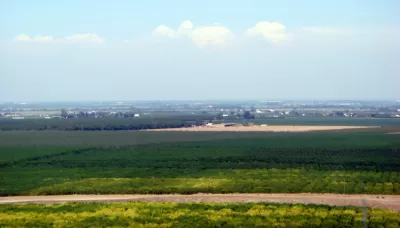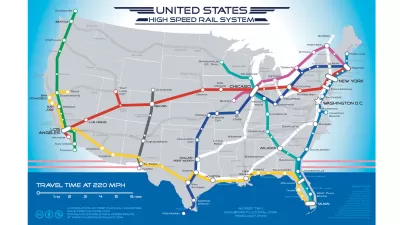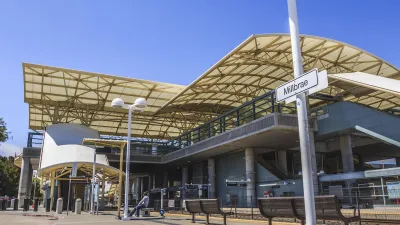Delays in acquiring properties are costing the project significant amounts of time and money.

Ralph Vartabedian reports on the status of the California High-Speed Rail Authority’s acquisition of land in the Central Valley. “The slow progress in many cases has pushed back construction timetables for the Los Angeles-to-San Francisco system, caused delay claims by contractors and hardened the emotions of some property owners.”
The project is already 13 years behind schedule, and the budget overrun is at $44 billion. In the Central Valley alone, the initial cost estimate of $332 million to acquire properties has skyrocketed to $1.5 billion. “There are fights about farm wells and trellises. Debates about the value of nut trees apart from the land where they grow. And tears shed over the loss of land held by families for more than a century,” says Vartabedian.
The authority still needs to acquire 160 of 378 parcels in Kings County. The area has complex agricultural systems, and resistance from farmers has been intense. “When a track cuts a vineyard diagonally, for instance, the trellis structure and the grape vines must be either removed or restrung. That can curtail production for years and the state has to pay for it, farmers say,” reports Vartabedian.
Adding to the slow progress is the fact that one judge from Southern California is hearing the disputes, since all of the county’s superior court judges have recused themselves, and Caltrans lawyers representing the authority are scattered throughout the state.
“The rail authority has acknowledged that it made serious errors in the Central Valley, issuing construction contracts before land was in hand and underestimating the difficulty of the process. It has vowed to not repeat those errors. But fixing what is already broken has become a long process,” notes Vartabedian.
FULL STORY: Bullet-train land acquisitions are moving so slowly a judge hearing the cases calls it a ‘lifetime job’

Planetizen Federal Action Tracker
A weekly monitor of how Trump’s orders and actions are impacting planners and planning in America.

Maui's Vacation Rental Debate Turns Ugly
Verbal attacks, misinformation campaigns and fistfights plague a high-stakes debate to convert thousands of vacation rentals into long-term housing.

Cuomo Is the Candidate of Both NIMBYs and Developers. What Gives?
In the New York City mayoral race, odd bedfellows align to preserve the housing status quo.

The Subversive Car-Free Guide to Trump's Great American Road Trip
Car-free ways to access Chicagoland’s best tourist attractions.

San Antonio and Austin are Fusing Into one Massive Megaregion
The region spanning the two central Texas cities is growing fast, posing challenges for local infrastructure and water supplies.

Charlottesville Temporarily Has No Zoning Code
A judge ordered the Virginia city to throw out its newly revised zoning code, leaving permitting for new development in legal limbo.
Urban Design for Planners 1: Software Tools
This six-course series explores essential urban design concepts using open source software and equips planners with the tools they need to participate fully in the urban design process.
Planning for Universal Design
Learn the tools for implementing Universal Design in planning regulations.
Heyer Gruel & Associates PA
JM Goldson LLC
Custer County Colorado
City of Camden Redevelopment Agency
City of Astoria
Transportation Research & Education Center (TREC) at Portland State University
Jefferson Parish Government
Camden Redevelopment Agency
City of Claremont





























